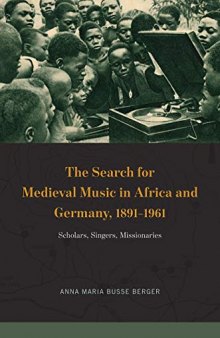 جزییات کتاب
جزییات کتاب
"The modern discipline of musicology has its roots in early-twentieth-century Germany and in three seemingly distinct but surprisingly connected areas of musical activity: the discovery of Medieval music and music theory through the all-consuming unearthing and decoding of documents; the tremendous growth of youth movements devoted to collective singing and music-making and the study of Medieval music; and the exportation of this music to Protestant and Catholic missions in German East Africa, where it was widely taught and performed. Underlying these activities was the belief that Medieval music, its structure and soundworld, had affinities with the music of "primitive" societies, such as those the missionaries encountered in East Africa. Rejected outright by African musicians and scholars at the time, the belief was kept alive in the European musicological community through the first half of the twentieth century. Anna Maria Busse Berger draws this all together for the first time, anchoring her writing in extensive archival research and her personal experience as the daughter of a German Lutheran missionary in East Africa. The result is a momentous re-thinking of the early history of music scholarship as well as a novel understanding of the imperial and colonial projects that shaped Germany's perception of itself at a crucial time in its history"--



 دانلود کتاب
دانلود کتاب

 جزییات کتاب
جزییات کتاب





 این کتاب رو مطالعه کردید؟ نظر شما چیست؟
این کتاب رو مطالعه کردید؟ نظر شما چیست؟
